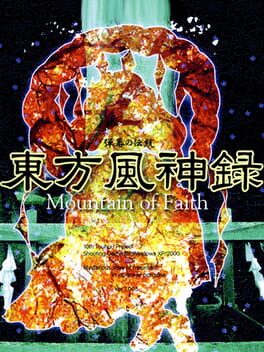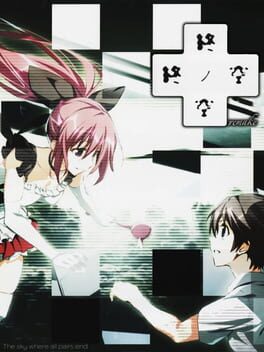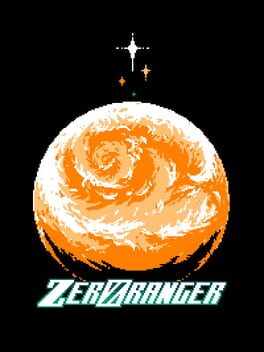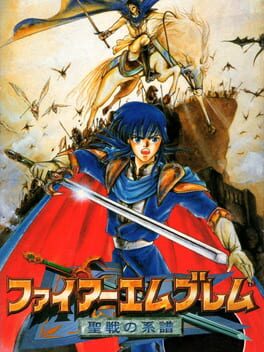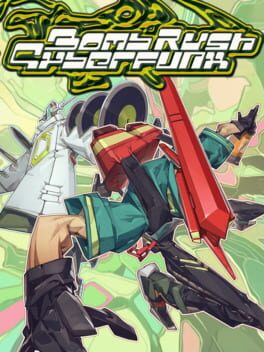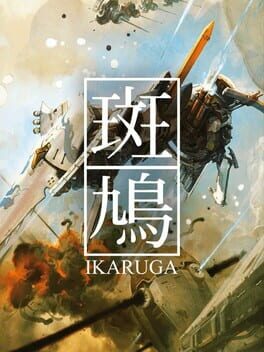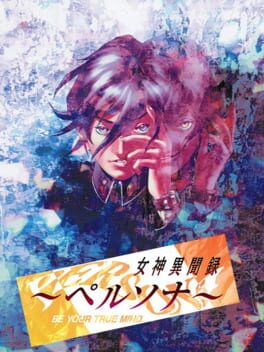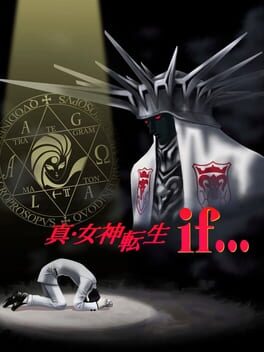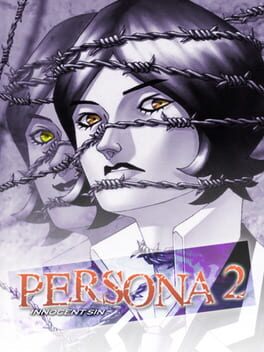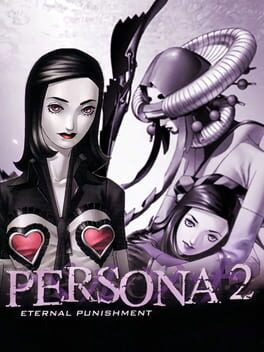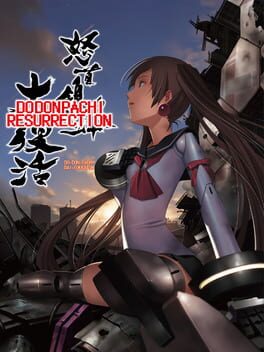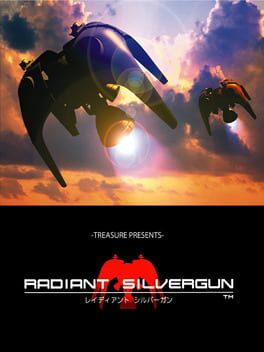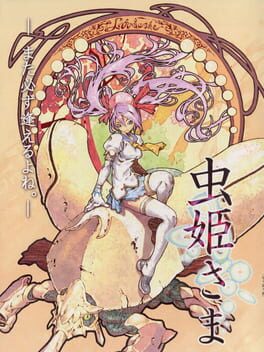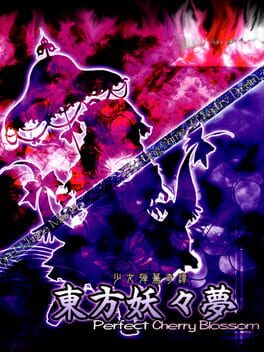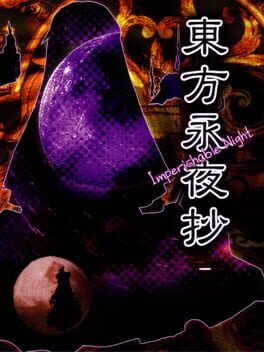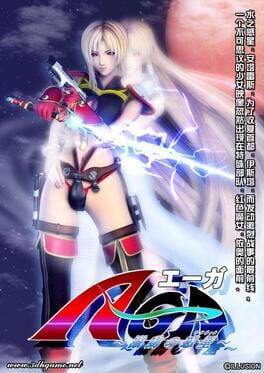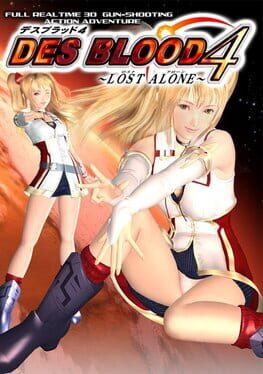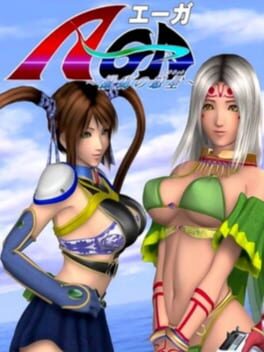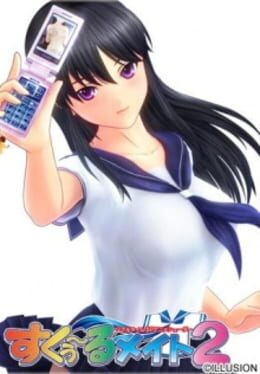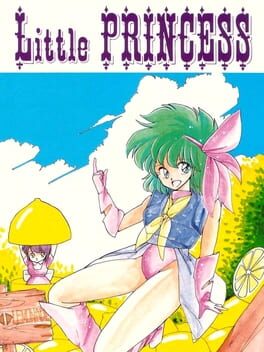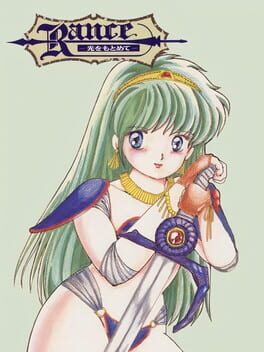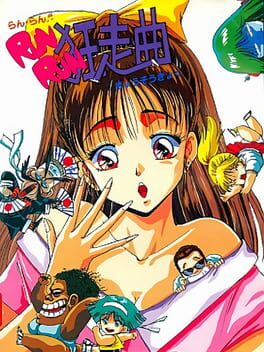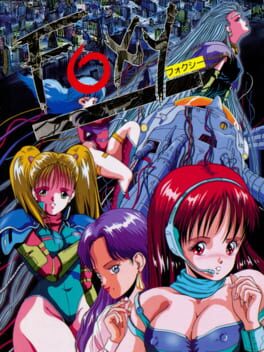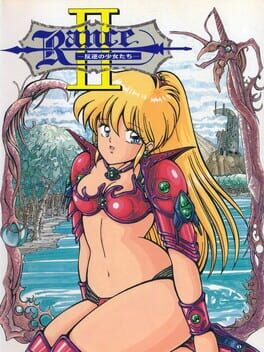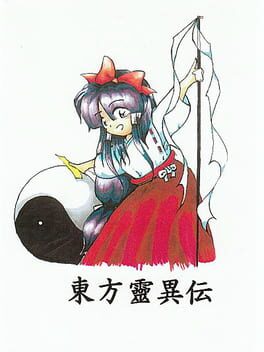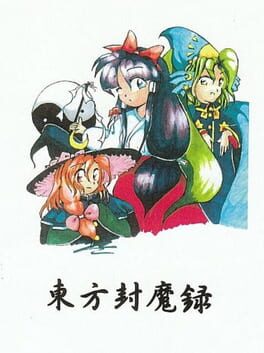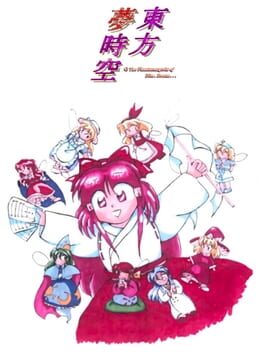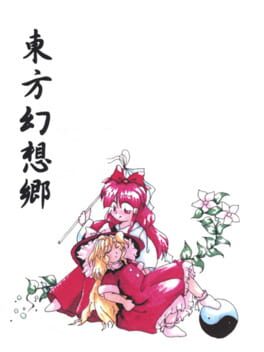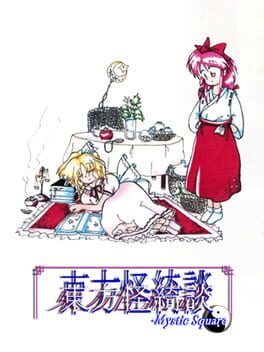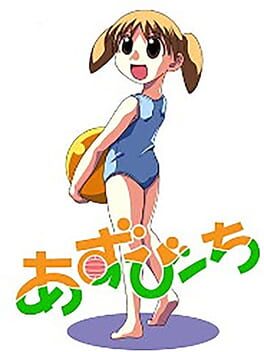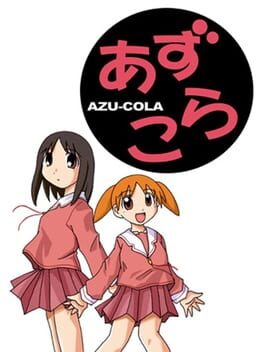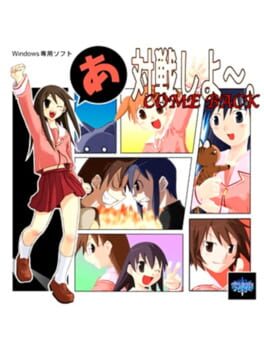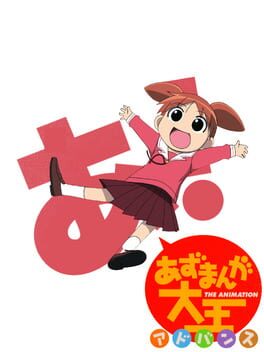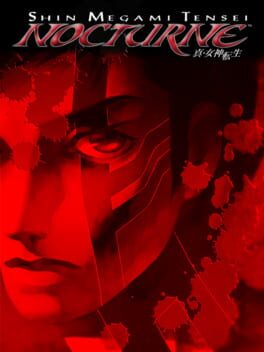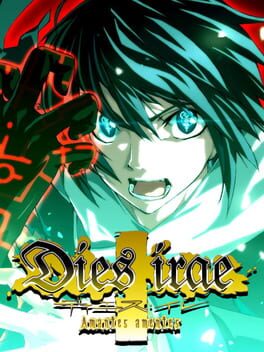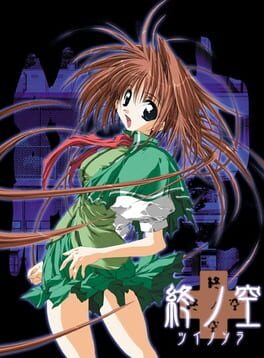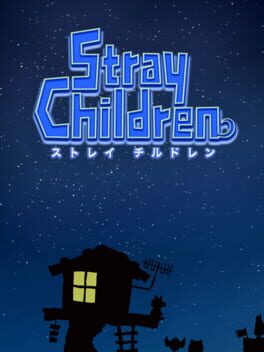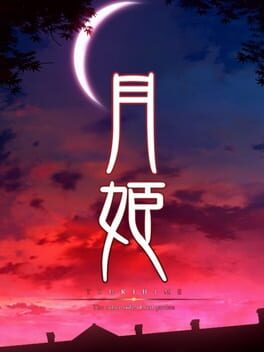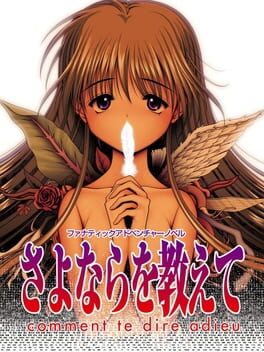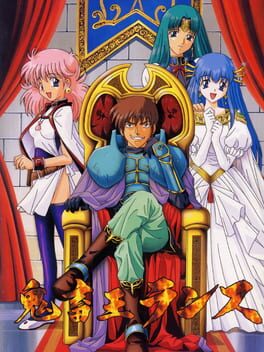CaioGoichi
126 reviews liked by CaioGoichi
eu ainda prefiro as vibes de Perfect Cherry Blossom e Imperishable Night mas não dá pra negar que esse é um dos pontos mais icônicos da série, quase ao nível de Embodiment of Scarlet Devil. eu conhecia uma boa parte das personagens e de suas músicas por pura osmose vinda do meus contatos com a fanbase. mas eu senti um pouco de falta da energia mais... rústica que os Touhous anteriores tinham, até mesmo em algo tão complexo como o 8º jogo da série. Esse é o primeiro Touhou que eu não sinto completa vontade de chegar ao final antes de partir para o próximo (cheguei na chefe final pelo menos), o que tudo bem inclusive.
Mountain of Faith ainda é um triunfo audiovisual interativo: a trilha sonora e os padrões de balas continuam espetaculares como sempre, as garotas novas que vão ser mais relevantes nos jogos futuros são ótimas adições ao elenco e a engine nova esbanja efeitos visuais muito bonitos durante as batalhas. mas eu realmente não gosto das mudanças do sistema de bombas e continues desse aqui. eu prefiro ser arremessada pro menu principal depois de morrer do que repetir a fase final só com duas miseráveis vidinhas, e fazer com que o uso de bombas diminua o poder do seu ataque normal é tryhard demais, até para os padrões dessa série. alias, antes você podia escolher a quantidade de vidas que você começa (com uma diminuição no seu score em números acima de 2) mas removeram isso também, talvez para não entrar em conflito com a nova maneira que os continues funcionam (para evitar por exemplo que você recomece a última fase com 6 vidas mesmo chegando nela com apenas 1).
mas a questão da energia presente nessa nova era da série ainda é a coisa que mais mexe comigo. eu fiquei matutando um pouco sobre isso e a minha namorada comparou esse sentimento meu como uma fã de punk ouvindo uma música pop punk, onde parte da estética mais bruta é substituída por algo mais sofisticado, mas que talvez tenha perdido parte da identidade presente no gênero. acho que faz sentido. apesar de que isso tecnicamente me torna uma Touhou boomer. tudo bem. eu também sou uma Morrowind boomer. eu ainda vou tentar os seguintes, tenho tempo para me acostumar
pra concluir esse jogo me fez perceber que eu não sou normal a respeito da Aya Shameimaru.
Mountain of Faith ainda é um triunfo audiovisual interativo: a trilha sonora e os padrões de balas continuam espetaculares como sempre, as garotas novas que vão ser mais relevantes nos jogos futuros são ótimas adições ao elenco e a engine nova esbanja efeitos visuais muito bonitos durante as batalhas. mas eu realmente não gosto das mudanças do sistema de bombas e continues desse aqui. eu prefiro ser arremessada pro menu principal depois de morrer do que repetir a fase final só com duas miseráveis vidinhas, e fazer com que o uso de bombas diminua o poder do seu ataque normal é tryhard demais, até para os padrões dessa série. alias, antes você podia escolher a quantidade de vidas que você começa (com uma diminuição no seu score em números acima de 2) mas removeram isso também, talvez para não entrar em conflito com a nova maneira que os continues funcionam (para evitar por exemplo que você recomece a última fase com 6 vidas mesmo chegando nela com apenas 1).
mas a questão da energia presente nessa nova era da série ainda é a coisa que mais mexe comigo. eu fiquei matutando um pouco sobre isso e a minha namorada comparou esse sentimento meu como uma fã de punk ouvindo uma música pop punk, onde parte da estética mais bruta é substituída por algo mais sofisticado, mas que talvez tenha perdido parte da identidade presente no gênero. acho que faz sentido. apesar de que isso tecnicamente me torna uma Touhou boomer. tudo bem. eu também sou uma Morrowind boomer. eu ainda vou tentar os seguintes, tenho tempo para me acostumar
pra concluir esse jogo me fez perceber que eu não sou normal a respeito da Aya Shameimaru.
Tsui no Sora Remake
2020
Considering I've already written over 7,000 words on the original Tsui no Sora on this site, I intend to keep things a little shorter for now. My intentions below are to both discuss some route-by-route feelings in comparison to the original game, as well as further ruminate on the philosophical and thematic elements of both Tsui no Sora and Subarashiki Hibi. I'll give a spoiler warning when we jump full-on into dangerously heavy spoiler territory below. Still, mild spoilers for all three games within.
I don't think you need to have played the original game to appreciate the remake, you certainly need Subahibi, though. The original is helpful for understanding some of the deliberate deviations the remake gets at, some of which are pretty major, but you could feasibly play this with just Subahibi under your belt and get 85% of the point. It's hard to image what sort of impression the remake would land if not taken as an addition to the previous iterations of this story. I think above all else, SCA-Ji was able to more directly address additional influences over the original Tsui no Sora in the remake. Not only did he buckle down and more directly address the most obvious influence, being Nietzsche and particularly Zarathustra, but the influences of Spinoza and Lovecraft are even more clearly dug into and elaborated upon here in ways that are rewarding if you've spent time thinking about Subahibi for as long as many of us have.
Presentation-wise, the remake is a very interesting hodgepodge of KeroMakura styles and talents. Motoyon and SCA-Ji both take lead artistic roles here, and while SCA-Ji very much still draws in the same style he has since around the H2O and Subahibi days, Motoyon was clearly already adjust his style for the upcoming Sakura no Toki and so it comes off much more modernized. Motoyon also did most of the CGs, which are absolutely beautiful. Rarely as abstract as some of Subahibi's, but beautiful nontheless.
This sort of disorientation is largely supplemented by the fact that many background elements are ripped right from Subahibi, and the soundtrack is pretty much all the original ~15 second loops from the original Tsui no Sora. ... Until this isn't the case from Fourth View onwards, where elements of Subahibi begin to melt in from the soundtrack to a few pieces of CGs. The voice cast is largely different, and the only people who reprise their roles from Subarashiki Hibi do so with intent. Largely great performances all around. Each of the ending themes is an instrumental remix of one of the Tsui no Sora tracks and they're all fantastic. I think my favorites were Third View and Numinöse II.
On a route by route basis -
First View was a bit different from the original, largely in how it characterizes Yukito. I really liked the more grounded and empathetic view of his character this time around, and I wouldn't say it "replaces" the original because they're largely coming from places with different intentions. Otherwise, note for note, extremely faithful to the original everywhere it should've been. Second View was definitely interesting. There were a few moments of characterization missing that I loved in the original, even if they were small beats, and at first I wasn't sure how I felt about it. But once the plot started ramping up and the big deviations from the original plotline kicked in, largely revolving around Yasuko's feelings towards Kotomi I ended up absolutely loving it. Despite some minor nitpicks in the first half it's absolutely a stronger version of this story line. I have little in the way of notes for Third Route. It's just a straight up improvement over the original in every way. Admittedly cried to the ending.
... And that's where things got really interesting.
Massive spoilers for the remake and Subarashiki Hibi below.
I had heard tell that Yasuko of all characters was the protagonist of a new route in the remake, but somehow I wasn't expecting it to be earlier in the game than Takuji. I also wasn't expecting it to be arguably the best part of the game. She's simply one of SCA-Ji's best characters I've yet to experience. A deeply morally conflicting character who scratches directly at the wound that plagues every iteration of this story - the incessant babbling about existentialism and purposelessness of life means nothing in the face of love. And Yasuko is a character who has had her humanity stripped from her by force - but still clings to the subconscious believe that love is worth fighting for. You can say she's really fucked up for how she tries to get with Kotomi and you're definitely right, but by the end of the route, when she and Kiyoshi just get to have that heart to heart... shit, man, that's the point of the whole story. That's what each version of this game has been trying to say since 1999. Even if SCA-Ji himself couldn't have put it into words yet.
Final View was certainly interesting. I really loved that some of the abstract visions from the original game were left intact, 1999 artwork against 2010 backgrounds and all. I also really enjoyed how much Takuji and Riruru were given time to expand upon their relationship to one another. One of the strongest elements of the remake's stab at this story is how much it points its cast in the direction of "reality of the heart". In the same way that Yasuko had to come to terms with her feelings for Kotomi, Takuji has to do the same for Yukito - the nature of those feelings may be vague, but I chose to interpret it as an attraction of the mind. Maybe there's some homo-eroticism in there and I wouldn't deny that, but I think it's more that Takuji sees a home and a place of understanding in Yukito. I'm... gonna have to sit with the moment he hears Kimika's voice and unbox why that was for a minute. It's the most confounding and jaw-dropping moment in the entire route and it's gone within a second. Again, there are a few minor things I do miss from the original, especially some of the more abstract denpa effects like Riruru's number spiral form or the eyeball bleeding into the pool, but this version of Final View has many aspects that undeniably surpass the original and at the very least do the series as a whole serious justice.
And then there's the Numinöse duology. Numinöse I seems largely unchanged from the original, but that's fine - I already like that ending more than most. Numinöse II has some interesting changes itself, and the duology as a whole stands as a rather interesting conclusion to the series overall. I'm happy that SCA-Ji keeps it vague and never actually explains what Ayana is. The Nyarlathotep explanation is an interesting proposition, the Cthulhu explanation is also interesting, and the way she molds and shifts around her necessities and whims, or those of others... all interesting. As far as where I stand on Ayana, and the purpose of the End Sky itself? Well...
First off, it was incredibly gratifying to get SCA-Ji backing me up on my original read of what the End Sky represents - it's the doorway to an Übermenschian evolution, the discarding of humanity and subjectivity to become, as Riruru and Ayana put it, a "third-dimensional existence". I think this is the purpose of Yasuko saying what she does on the rooftop to Takuji - to discard humanity is to discard our ability to love, because love is founded in perception and irrational thought. It's not so much that the End Sky exists, or that it doesn't - it appears in many ways to many people, as an escape, as an evolution, as an ending. Perhaps that's why Kimika's voice reaches Takuji in the end, as a reminder that he is human, and is capable of a love that transcends his own delusions. I've said it before, and I'll say it again - Down the Rabbit-Hole I and the "good endings" of Subahibi are the entire point. They're the response SCA-Ji makes to himself and his work in Tsui no Sora, and now he's returned to this early work and planted seeds of that answer into the bleak and hopeless place he left behind in 1999. I do believe the only presence that actually does sit above humanity in all of this is Ayana - who is more of an idea than a tangible thing. I think you can rationalize that existence many ways: a monster, a schoolgirl, a cosmic terror, a god, a magical girl - but ultimately, Ayana is objectivity. She is the third-dimensional existence that plays out stories and creates scenarios for the purpose of understanding humanity. And if it's not directly her doing - though clarity on that isn't really necessary - then she's merely observing. It's not that she's cold, it's not that she's cruel, feelings just don't process for her. It's all an imitation or an attempt to emulate expression. But that begs the question, which she asks Yasuko - what's the difference in attempting to understand and engage with human emotion and actually having those emotions, considering neither exist on the plane of logical thinking or rationality either way? Where does the line blur between emulation and experience? Fantasy and reality? Truth or feelings? An ending or a beginning? Takuji or Yukito? Ayana or Kotomi? The End Sky. The unreachable all-knowingness that we seek in spite of its non-existence. Human ambition. Yearning to understand. Indulgence in sophistry. The answer was already in front of us. Live happily in the wonderful everyday.
SCA-Ji is the fucking man. That's the be-all-end-all of this whole thing.
I don't think you need to have played the original game to appreciate the remake, you certainly need Subahibi, though. The original is helpful for understanding some of the deliberate deviations the remake gets at, some of which are pretty major, but you could feasibly play this with just Subahibi under your belt and get 85% of the point. It's hard to image what sort of impression the remake would land if not taken as an addition to the previous iterations of this story. I think above all else, SCA-Ji was able to more directly address additional influences over the original Tsui no Sora in the remake. Not only did he buckle down and more directly address the most obvious influence, being Nietzsche and particularly Zarathustra, but the influences of Spinoza and Lovecraft are even more clearly dug into and elaborated upon here in ways that are rewarding if you've spent time thinking about Subahibi for as long as many of us have.
Presentation-wise, the remake is a very interesting hodgepodge of KeroMakura styles and talents. Motoyon and SCA-Ji both take lead artistic roles here, and while SCA-Ji very much still draws in the same style he has since around the H2O and Subahibi days, Motoyon was clearly already adjust his style for the upcoming Sakura no Toki and so it comes off much more modernized. Motoyon also did most of the CGs, which are absolutely beautiful. Rarely as abstract as some of Subahibi's, but beautiful nontheless.
This sort of disorientation is largely supplemented by the fact that many background elements are ripped right from Subahibi, and the soundtrack is pretty much all the original ~15 second loops from the original Tsui no Sora. ... Until this isn't the case from Fourth View onwards, where elements of Subahibi begin to melt in from the soundtrack to a few pieces of CGs. The voice cast is largely different, and the only people who reprise their roles from Subarashiki Hibi do so with intent. Largely great performances all around. Each of the ending themes is an instrumental remix of one of the Tsui no Sora tracks and they're all fantastic. I think my favorites were Third View and Numinöse II.
On a route by route basis -
First View was a bit different from the original, largely in how it characterizes Yukito. I really liked the more grounded and empathetic view of his character this time around, and I wouldn't say it "replaces" the original because they're largely coming from places with different intentions. Otherwise, note for note, extremely faithful to the original everywhere it should've been. Second View was definitely interesting. There were a few moments of characterization missing that I loved in the original, even if they were small beats, and at first I wasn't sure how I felt about it. But once the plot started ramping up and the big deviations from the original plotline kicked in, largely revolving around Yasuko's feelings towards Kotomi I ended up absolutely loving it. Despite some minor nitpicks in the first half it's absolutely a stronger version of this story line. I have little in the way of notes for Third Route. It's just a straight up improvement over the original in every way. Admittedly cried to the ending.
... And that's where things got really interesting.
Massive spoilers for the remake and Subarashiki Hibi below.
I had heard tell that Yasuko of all characters was the protagonist of a new route in the remake, but somehow I wasn't expecting it to be earlier in the game than Takuji. I also wasn't expecting it to be arguably the best part of the game. She's simply one of SCA-Ji's best characters I've yet to experience. A deeply morally conflicting character who scratches directly at the wound that plagues every iteration of this story - the incessant babbling about existentialism and purposelessness of life means nothing in the face of love. And Yasuko is a character who has had her humanity stripped from her by force - but still clings to the subconscious believe that love is worth fighting for. You can say she's really fucked up for how she tries to get with Kotomi and you're definitely right, but by the end of the route, when she and Kiyoshi just get to have that heart to heart... shit, man, that's the point of the whole story. That's what each version of this game has been trying to say since 1999. Even if SCA-Ji himself couldn't have put it into words yet.
Final View was certainly interesting. I really loved that some of the abstract visions from the original game were left intact, 1999 artwork against 2010 backgrounds and all. I also really enjoyed how much Takuji and Riruru were given time to expand upon their relationship to one another. One of the strongest elements of the remake's stab at this story is how much it points its cast in the direction of "reality of the heart". In the same way that Yasuko had to come to terms with her feelings for Kotomi, Takuji has to do the same for Yukito - the nature of those feelings may be vague, but I chose to interpret it as an attraction of the mind. Maybe there's some homo-eroticism in there and I wouldn't deny that, but I think it's more that Takuji sees a home and a place of understanding in Yukito. I'm... gonna have to sit with the moment he hears Kimika's voice and unbox why that was for a minute. It's the most confounding and jaw-dropping moment in the entire route and it's gone within a second. Again, there are a few minor things I do miss from the original, especially some of the more abstract denpa effects like Riruru's number spiral form or the eyeball bleeding into the pool, but this version of Final View has many aspects that undeniably surpass the original and at the very least do the series as a whole serious justice.
And then there's the Numinöse duology. Numinöse I seems largely unchanged from the original, but that's fine - I already like that ending more than most. Numinöse II has some interesting changes itself, and the duology as a whole stands as a rather interesting conclusion to the series overall. I'm happy that SCA-Ji keeps it vague and never actually explains what Ayana is. The Nyarlathotep explanation is an interesting proposition, the Cthulhu explanation is also interesting, and the way she molds and shifts around her necessities and whims, or those of others... all interesting. As far as where I stand on Ayana, and the purpose of the End Sky itself? Well...
First off, it was incredibly gratifying to get SCA-Ji backing me up on my original read of what the End Sky represents - it's the doorway to an Übermenschian evolution, the discarding of humanity and subjectivity to become, as Riruru and Ayana put it, a "third-dimensional existence". I think this is the purpose of Yasuko saying what she does on the rooftop to Takuji - to discard humanity is to discard our ability to love, because love is founded in perception and irrational thought. It's not so much that the End Sky exists, or that it doesn't - it appears in many ways to many people, as an escape, as an evolution, as an ending. Perhaps that's why Kimika's voice reaches Takuji in the end, as a reminder that he is human, and is capable of a love that transcends his own delusions. I've said it before, and I'll say it again - Down the Rabbit-Hole I and the "good endings" of Subahibi are the entire point. They're the response SCA-Ji makes to himself and his work in Tsui no Sora, and now he's returned to this early work and planted seeds of that answer into the bleak and hopeless place he left behind in 1999. I do believe the only presence that actually does sit above humanity in all of this is Ayana - who is more of an idea than a tangible thing. I think you can rationalize that existence many ways: a monster, a schoolgirl, a cosmic terror, a god, a magical girl - but ultimately, Ayana is objectivity. She is the third-dimensional existence that plays out stories and creates scenarios for the purpose of understanding humanity. And if it's not directly her doing - though clarity on that isn't really necessary - then she's merely observing. It's not that she's cold, it's not that she's cruel, feelings just don't process for her. It's all an imitation or an attempt to emulate expression. But that begs the question, which she asks Yasuko - what's the difference in attempting to understand and engage with human emotion and actually having those emotions, considering neither exist on the plane of logical thinking or rationality either way? Where does the line blur between emulation and experience? Fantasy and reality? Truth or feelings? An ending or a beginning? Takuji or Yukito? Ayana or Kotomi? The End Sky. The unreachable all-knowingness that we seek in spite of its non-existence. Human ambition. Yearning to understand. Indulgence in sophistry. The answer was already in front of us. Live happily in the wonderful everyday.
SCA-Ji is the fucking man. That's the be-all-end-all of this whole thing.
ZeroRanger
2018
-Essa review foi feita depois da minha primeira jogatina, zerei o jogo mais 2 vezes, desde então algumas opiniões mudaram, aprendi mais coisas do jogo e ganhei novas ideias de como melhorar alguns pontos. Como é muita coisa, irei no futuro fazer outra review e deixar essa outra aqui.
O começo do jogo me assustou sinceramente, ele é muito expositivo, tacando uns 40 países e personagens que você não vai lembrar, felizmente o jogo vai com mais calma ao decorrer da história, contando o que é importante no momento, e quem diria temos uma puta de uma ótima história aqui, ela é relativamente pesada e recheada de momentos marcantes, que inclusive conseguiu me fazer chorar (sim eu tenho sentimentos).
Os personagens do jogo variam de genéricos para os melhores de toda franquia, tem líderes de batalhões que literalmente reusam portraits com bastante frequência, mas os que importam realmente importam: bom utilizo e boa escrita por grande parte do jogo; ótimos vilões, alguns bem difíceis de derrotar; bons diálogos entre suas units, mesmo que poucos. Escrita é o forte de Genealogy. Mas agora vou me aprofundar na outra metade do jogo que deixa um pouco a desejar: a gameplay.
A gameplay desse jogo é muito diferente em comparação a grande maioria dos outros títulos: poucos capítulos mas mapas gigantes, skills para dar crítico e double attack? Dinheiro separado por unit? Troca de itens que precisa de dinheiro? Arena quebrada que não te faz perder dinheiro e nem te mata caso você perca? Wut??? O primeiro mapa do jogo é facilmente um dos melhores mapas da franquia, grande, cheio de objetivos, separação de units para fazer multitasks te incentivando a jogar de uma forma mais agressiva; são pontos que o jogo ensina sem precisar de nenhum tutorial com 924 falas, e são pontos que todos os mapas futuros vão usar, aí vem o segundo mapa que literalmente taca uma floresta gigante limitando o movimento de todas as units fds. Os mapas são longos, muito longos, isso passa a sensação de que você realmente está explorando todo o continente, que é algo legal no papel, entretanto a pouca variedade nos mapas e o ato de mover todas as suas units, fazem com que a gameplay fique massante bem rápido. Resumindo é bem chato ter que mover suas 20 units por uns 10 turnos para chegar em um lugar, só pra dps repetir isso mais umas 10 vezes (especialmente as units de infantry).
Não me entenda mal, o jogo possuí diversos bons fatores em termos de gameplay: personalização de skills e armas para a segunda geração, return e warp staffs ajudam a transitar suas units, ajustar sua party no castelo principal (o que pode ser um ponto negativo, pois demora muito), 4 slots de saves que podem ser dados no início de cada turno, animações de combate boas e rápidas e o melhor sendo: a constante sensação de pressa e “eita fudeu” que o jogo te dá. Mas sinceramente eu prefiro a sensação de terminar um capítulo curto dos outros jogos da franquia, do que parar e salvar no meio de um capítulo do genealogy.
Genealogy é de fato um jogo maravilhoso, uma ótima história, momentos memoráveis, ótimos personagens e tramas, entretanto, seus problemas de balanceamento na gameplay, são um ponto que faz o jogo ser bem desgastante e me impede de dar uma nota maior. Um remake seria ótimo, agilizar a gameplay e amenizar um pouco a sensação de desgaste, seria muito bem vindo, mas eu já me satisfaria com uma localização oficial. Mas vendo o que a nintendo fez com a localização do primeiro jogo dá até um desânimo.
-Nitpicks:
.Vai se fuder quem colocou itens em tiles específicos com personagens específicos, sem nenhum tipo de indicação, Lex literalmente vai de uma boa unit para uma das melhores do jogo por causa do Brave axe escondido;
.A UI do jogo é bem burrinha de vez em quando;
.Os dois bosses finais do antepenúltimo e penúltimo capítulo foram bem mais difíceis que o boss final fds.
-Coisas que gostaria que um remake concertasse que não abordei na análise
.Opções de dificuldade, seria algo maneiro o modo hard só te permitindo salvar tipo de 3 em 3 turnos ou um número maior, minha ideia mesmo;
.Mais diálogos entre suas units seria muito bem-vindo e uma adoção de uma ou outra mecânica de support dos jogos mais modernos também. Isso ajudaria também no problema de que você não tem controle de quem se casa com quem, quando as duas chegam em 500 pontos boom se casam, fazer com que essa opção seja bloqueada até o jogador escolher que quer que aconteça igual aos jogos futuros seria maneiro;
.Gostaria que todos os castelos que você desse seize fossem como o seu principal, não limitando as opções de upar de classe e literalmente entrar neles, assim daria um melhor benefício para protegê-los, sua unit pode alcançar o level 20 no meio do capítulo e ela só poder upar de classe somente voltando pro primeiro castelo, o jogo até que pensou sobre isso te permitindo continuar upando mesmo depois do level 20, mas ainda é muito paia. (E pelo amor de deus permitam que o castelo da Lachesis e do Ced permitam dar seize, poder usar warp pra eles ajudaria muito a acelerar o fluxo desses capítulos);
.Rebalanceamento de units infantry: mais leg rings disponíveis no jogo e de preferência exclusivo à units infantrys, adição de move ou mais classes que ganhem cavalo ao upar de classe, etc. Qualquer coisa que diminua minimamente o gap absurdo entre cavalaria e infantry seria bem vindo. (Imagina elas terem growth rate de move que nem o Thracia kakaka);
.Brincar na arena é divertido, mas gostaria que tivesse um pouco mais de limitações para torná-la menos quebrada;
.Healers são sua principal ferramenta de transitar pelo mapa mais rápido com staffs, mas o foda é que elas são péssimas em se transitar, inclusive tendo menos move que units infantry padrões, poder usar as staffs nelas mesmas e dar a elas move padrão de infantry seria maneiro (no caso tive uma ideia foda de dar para uma delas um Return band, fazendo com que ela de warp em todo mundo e volte pro castelo depois, fiquei orgulhoso disso). Continuando nelas, gostaria que o level para elas uparem de classe fosse menor, especialmente a classe de priests, já que eles só ganha magia depois de upar de classe (dica gaymer warp e return staff dão muito mais exp do que heal/mend floodá-los sem necessidade é uma boa maneira de upa-lás rápido, mas ainda é grind);
.Algumas units deixam sua equipe e isso vem do nada mesmo, você pode perder vários bons itens porque você deixou neles. Uma solução que pensei é que o jogo te der dicas disso antes delas saírem, mantendo essas units no castelo só pra botar no pawnbroke e ai no segundo turno ou depois da troca eles se mandarem, claro mantendo armas importantes para eles impossibilitadas de serem vendidas;
.Porra de skill pra double attack e crítico, isso deve já ser base no jogo.
O começo do jogo me assustou sinceramente, ele é muito expositivo, tacando uns 40 países e personagens que você não vai lembrar, felizmente o jogo vai com mais calma ao decorrer da história, contando o que é importante no momento, e quem diria temos uma puta de uma ótima história aqui, ela é relativamente pesada e recheada de momentos marcantes, que inclusive conseguiu me fazer chorar (sim eu tenho sentimentos).
Os personagens do jogo variam de genéricos para os melhores de toda franquia, tem líderes de batalhões que literalmente reusam portraits com bastante frequência, mas os que importam realmente importam: bom utilizo e boa escrita por grande parte do jogo; ótimos vilões, alguns bem difíceis de derrotar; bons diálogos entre suas units, mesmo que poucos. Escrita é o forte de Genealogy. Mas agora vou me aprofundar na outra metade do jogo que deixa um pouco a desejar: a gameplay.
A gameplay desse jogo é muito diferente em comparação a grande maioria dos outros títulos: poucos capítulos mas mapas gigantes, skills para dar crítico e double attack? Dinheiro separado por unit? Troca de itens que precisa de dinheiro? Arena quebrada que não te faz perder dinheiro e nem te mata caso você perca? Wut??? O primeiro mapa do jogo é facilmente um dos melhores mapas da franquia, grande, cheio de objetivos, separação de units para fazer multitasks te incentivando a jogar de uma forma mais agressiva; são pontos que o jogo ensina sem precisar de nenhum tutorial com 924 falas, e são pontos que todos os mapas futuros vão usar, aí vem o segundo mapa que literalmente taca uma floresta gigante limitando o movimento de todas as units fds. Os mapas são longos, muito longos, isso passa a sensação de que você realmente está explorando todo o continente, que é algo legal no papel, entretanto a pouca variedade nos mapas e o ato de mover todas as suas units, fazem com que a gameplay fique massante bem rápido. Resumindo é bem chato ter que mover suas 20 units por uns 10 turnos para chegar em um lugar, só pra dps repetir isso mais umas 10 vezes (especialmente as units de infantry).
Não me entenda mal, o jogo possuí diversos bons fatores em termos de gameplay: personalização de skills e armas para a segunda geração, return e warp staffs ajudam a transitar suas units, ajustar sua party no castelo principal (o que pode ser um ponto negativo, pois demora muito), 4 slots de saves que podem ser dados no início de cada turno, animações de combate boas e rápidas e o melhor sendo: a constante sensação de pressa e “eita fudeu” que o jogo te dá. Mas sinceramente eu prefiro a sensação de terminar um capítulo curto dos outros jogos da franquia, do que parar e salvar no meio de um capítulo do genealogy.
Genealogy é de fato um jogo maravilhoso, uma ótima história, momentos memoráveis, ótimos personagens e tramas, entretanto, seus problemas de balanceamento na gameplay, são um ponto que faz o jogo ser bem desgastante e me impede de dar uma nota maior. Um remake seria ótimo, agilizar a gameplay e amenizar um pouco a sensação de desgaste, seria muito bem vindo, mas eu já me satisfaria com uma localização oficial. Mas vendo o que a nintendo fez com a localização do primeiro jogo dá até um desânimo.
-Nitpicks:
.Vai se fuder quem colocou itens em tiles específicos com personagens específicos, sem nenhum tipo de indicação, Lex literalmente vai de uma boa unit para uma das melhores do jogo por causa do Brave axe escondido;
.A UI do jogo é bem burrinha de vez em quando;
.Os dois bosses finais do antepenúltimo e penúltimo capítulo foram bem mais difíceis que o boss final fds.
-Coisas que gostaria que um remake concertasse que não abordei na análise
.Opções de dificuldade, seria algo maneiro o modo hard só te permitindo salvar tipo de 3 em 3 turnos ou um número maior, minha ideia mesmo;
.Mais diálogos entre suas units seria muito bem-vindo e uma adoção de uma ou outra mecânica de support dos jogos mais modernos também. Isso ajudaria também no problema de que você não tem controle de quem se casa com quem, quando as duas chegam em 500 pontos boom se casam, fazer com que essa opção seja bloqueada até o jogador escolher que quer que aconteça igual aos jogos futuros seria maneiro;
.Gostaria que todos os castelos que você desse seize fossem como o seu principal, não limitando as opções de upar de classe e literalmente entrar neles, assim daria um melhor benefício para protegê-los, sua unit pode alcançar o level 20 no meio do capítulo e ela só poder upar de classe somente voltando pro primeiro castelo, o jogo até que pensou sobre isso te permitindo continuar upando mesmo depois do level 20, mas ainda é muito paia. (E pelo amor de deus permitam que o castelo da Lachesis e do Ced permitam dar seize, poder usar warp pra eles ajudaria muito a acelerar o fluxo desses capítulos);
.Rebalanceamento de units infantry: mais leg rings disponíveis no jogo e de preferência exclusivo à units infantrys, adição de move ou mais classes que ganhem cavalo ao upar de classe, etc. Qualquer coisa que diminua minimamente o gap absurdo entre cavalaria e infantry seria bem vindo. (Imagina elas terem growth rate de move que nem o Thracia kakaka);
.Brincar na arena é divertido, mas gostaria que tivesse um pouco mais de limitações para torná-la menos quebrada;
.Healers são sua principal ferramenta de transitar pelo mapa mais rápido com staffs, mas o foda é que elas são péssimas em se transitar, inclusive tendo menos move que units infantry padrões, poder usar as staffs nelas mesmas e dar a elas move padrão de infantry seria maneiro (no caso tive uma ideia foda de dar para uma delas um Return band, fazendo com que ela de warp em todo mundo e volte pro castelo depois, fiquei orgulhoso disso). Continuando nelas, gostaria que o level para elas uparem de classe fosse menor, especialmente a classe de priests, já que eles só ganha magia depois de upar de classe (dica gaymer warp e return staff dão muito mais exp do que heal/mend floodá-los sem necessidade é uma boa maneira de upa-lás rápido, mas ainda é grind);
.Algumas units deixam sua equipe e isso vem do nada mesmo, você pode perder vários bons itens porque você deixou neles. Uma solução que pensei é que o jogo te der dicas disso antes delas saírem, mantendo essas units no castelo só pra botar no pawnbroke e ai no segundo turno ou depois da troca eles se mandarem, claro mantendo armas importantes para eles impossibilitadas de serem vendidas;
.Porra de skill pra double attack e crítico, isso deve já ser base no jogo.
Bomb Rush Cyberfunk
2023
Entrei no jogo esperando algo parecido com jet set radio, e sai completamente surpreso.
O jogo usa da movimentação através de deslizes em corrimões com uma mecânica semelhante a tony hawk, também utilizando de manobras e deslizes em paredes, assim deixando a gameplay mais dinâmica e divertida, sendo basicamente uma sequencia de jet set radio.
E tudo isso ganha mais brilho com a sua trilha sonora, que conta até mesmo com a supervisão do criador da ost do próprio jet set radio, contando com músicas que ampliam a experiência, a deixando menos repetitiva e mais divertida.
A historia do jogo foi o que mais me surpreendeu, pois eu não esperava algo realmente trabalhado, e para não afetar a experiência de ninguém, não vou contar.
De fato o jogo me surpreendeu muito e me deixou vidrado por horas na tela, porém vale a pena ressaltar que o jogo fica repetitivo em alguns momentos, por isso recomendo degustar o jogo de maneira mais lenta e descontraída.
conclusão: se te ver oportunidade jogue, o maior problema mesmo é o preço.
O jogo usa da movimentação através de deslizes em corrimões com uma mecânica semelhante a tony hawk, também utilizando de manobras e deslizes em paredes, assim deixando a gameplay mais dinâmica e divertida, sendo basicamente uma sequencia de jet set radio.
E tudo isso ganha mais brilho com a sua trilha sonora, que conta até mesmo com a supervisão do criador da ost do próprio jet set radio, contando com músicas que ampliam a experiência, a deixando menos repetitiva e mais divertida.
A historia do jogo foi o que mais me surpreendeu, pois eu não esperava algo realmente trabalhado, e para não afetar a experiência de ninguém, não vou contar.
De fato o jogo me surpreendeu muito e me deixou vidrado por horas na tela, porém vale a pena ressaltar que o jogo fica repetitivo em alguns momentos, por isso recomendo degustar o jogo de maneira mais lenta e descontraída.
conclusão: se te ver oportunidade jogue, o maior problema mesmo é o preço.
Final Fantasy VI
1994
Ikaruga
2002
"Thus achieve your mission without any regrets."
"I will not die until I achieve something. Although the Ideal is high, I never give in. Therefore I never die with regret."
Então....não tenho o que dizer de forma adequada sem uma pesquisa, peço perdao pois nao sera uma analise, só um comentário arbitrário como quase sempre.
Esse jogo encapsula tudo o que eu mais amo numa temática e conclusão ( o final desse jogo é apoteótico pkrl)
É um jogo especial apesar dos perrengues que passei, sério muito mais difícil que radiant e realmente me incomodou pra valer num certo stage (sim aquele mesmo.)
Dito isso aquela primeira frase estará marcada para sempre em mim, provavelmente uma das melhores frases inseridas.
Amo também como cada stage tem uma temática própria e como a música ressoa em cada estágio é um trabalho muito cuidadoso e resultou numa realização perfeita, a harmonia musical aqui é impecável.
Terminei esse jogo com lágrimas apenas, minha visão sobre esse genero expandiu após esse camarada.
"I will not die until I achieve something. Although the Ideal is high, I never give in. Therefore I never die with regret."
Então....não tenho o que dizer de forma adequada sem uma pesquisa, peço perdao pois nao sera uma analise, só um comentário arbitrário como quase sempre.
Esse jogo encapsula tudo o que eu mais amo numa temática e conclusão ( o final desse jogo é apoteótico pkrl)
É um jogo especial apesar dos perrengues que passei, sério muito mais difícil que radiant e realmente me incomodou pra valer num certo stage (sim aquele mesmo.)
Dito isso aquela primeira frase estará marcada para sempre em mim, provavelmente uma das melhores frases inseridas.
Amo também como cada stage tem uma temática própria e como a música ressoa em cada estágio é um trabalho muito cuidadoso e resultou numa realização perfeita, a harmonia musical aqui é impecável.
Terminei esse jogo com lágrimas apenas, minha visão sobre esse genero expandiu após esse camarada.
Baldur's Gate 3
2020
Wow. Simply, wow. I never buy games around this price, usually I wait some time until a generous discount comes. But not with Baldur's Gate 3: for the first time, I felt attachment to a game. Nothing could've prepared me for everything I have experienced while playing this game. It is simply fantastic.
Not only is it extremely addictive (I would play 7 hours daily, do not recommend, but I just could not get off), there seem to be endless possibilities in anything you could think of. So much so, than even I (someone who loves exploring and not leaving things in the dark) have missed some key points that I would love to experience in a second run. I do not think anyone can even just play this game "once" it is just THAT good. But I do have to leave it aside if I really want to play other games (really, it is SO addictive). This game brought me back to all these fantasy games I tried playing as a kid, there is nothing negative I can say about BG3 (as you can even find a way to cheese even the harder fights). I would give this game a 100 if I could, it really was GOTY 2023.
Though this game has made me fall in love with the most gorgeous fictional cleric... Shadowheart, I'll never forget you. She had me giggling and kicking my feet, never been this down bad before
Not only is it extremely addictive (I would play 7 hours daily, do not recommend, but I just could not get off), there seem to be endless possibilities in anything you could think of. So much so, than even I (someone who loves exploring and not leaving things in the dark) have missed some key points that I would love to experience in a second run. I do not think anyone can even just play this game "once" it is just THAT good. But I do have to leave it aside if I really want to play other games (really, it is SO addictive). This game brought me back to all these fantasy games I tried playing as a kid, there is nothing negative I can say about BG3 (as you can even find a way to cheese even the harder fights). I would give this game a 100 if I could, it really was GOTY 2023.
Though this game has made me fall in love with the most gorgeous fictional cleric... Shadowheart, I'll never forget you. She had me giggling and kicking my feet, never been this down bad before
Mother 3
2006
9 lists liked by CaioGoichi
by maradona |
110 Games
by stealthrush |
100 Games
by Zanes |
622 Games
by IzayoiKizu |
30 Games
by skellygore |
13 Games
by TheFred |
263 Games
by Frost51 |
101 Games
